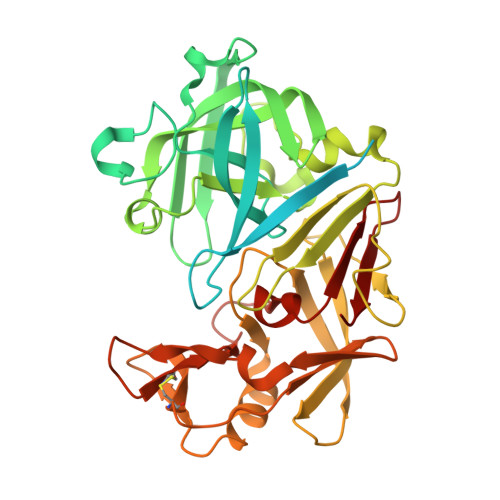Fragtory: Pharmacophore-Focused Design, Synthesis, and Evaluation of an sp 3 -Enriched Fragment Library.
Buhrmann, M., Kallepu, S., Warmuth, J.D., Wiese, J.N., Ehrt, C., Vatheuer, H., Hiller, W., Seitz, C., Levy, L., Czodrowski, P., Sievers, S., Muller, M.P., Rauh, D.(2023) J Med Chem 66: 6297-6314
- PubMed: 37130057
- DOI: https://doi.org/10.1021/acs.jmedchem.3c00187
- Primary Citation of Related Structures:
8C6P, 8C6Q, 8C6S, 8C6T, 8C70, 8C71, 8C72, 8C74 - PubMed Abstract:
Fragment-based drug discovery has played an important role in medicinal chemistry and pharmaceutical research. Despite numerous demonstrated successes, the limited diversity and overrepresentation of planar, sp 2 -rich structures in commercial libraries often hamper the full potential of this approach. Hence, the thorough design of screening libraries inevitably determines the probability for meaningful hits and subsequent structural elaboration. Against this background, we present the generation of an exclusive fragment library based on iterative entry nomination by a specifically designed computational workflow: "Fragtory". Following a pharmacophore diversity-driven approach, we used Fragtory in an interdisciplinary academic setting to guide both tailored synthesis efforts and the implementation of in-house compounds to build a curated 288-member library of sp 3 -enriched fragments. Subsequent NMR screens against a model protein and hit validation by protein crystallography led to the identification of structurally novel ligands that were further characterized by isothermal titration calorimetry, demonstrating the applicability of our experimental approach.
Organizational Affiliation:
Department of Chemistry and Chemical Biology, TU Dortmund University, Otto-Hahn-Strasse 4a, Dortmund 44227, Germany.
















